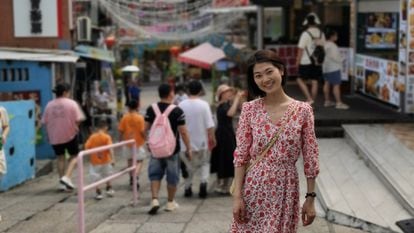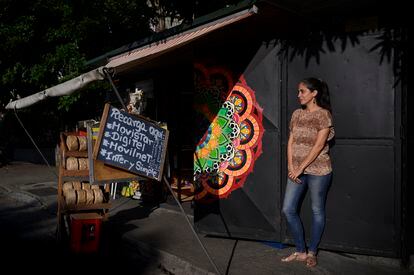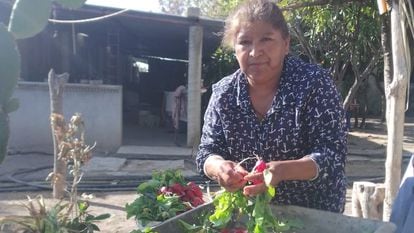Tides of money move the world in a kind of transfer from rich to poor countries. In 2022, the last full year for which there are records, remittances from migrants to their countries of origin moved 647,000 million dollars (566,000 million euros), according to the World Bank, which last June estimated 656,000 million dollars for 2023. Figures that did not stop during the pandemic and will not stop in the next few years, according to analyzes by international organizations. From China, Mexico and Venezuela come these four stories about resignations, work, precariousness, perseverance and great solidarity.
“For a long time, money gave me up”
Zuleika García's daughter sends $100, medicine, hygiene and cleaning products every month to her family in Venezuela
The Venezuelan Zuleika García, 72 years old, already retired after a professional life dedicated to education, lives with her husband—also a pensioner, after five decades of work—in a middle-class apartment in Caracas. “I taught in preschools, in primary education, and I also worked in higher education, in several public and private technical career institutes. For a long time, the money worked for me,” she says. That stopped being the case a few years ago, around 2013, long before her daughter decided to leave Venezuela for Spain.
“Here things were going well…” She was an art professor at the Catholic University and the Central University for a long time, but the economic and social situation deteriorated too much and she finally left. It was 2020. Since then, the 175 bolivars ($8) of his retirement for three decades of service, the 130 bolivars of Social Security, as well as some minor subsidies, are supplemented by around 100 dollars, medicines and hygiene products and cleaning supplies – “they are expensive here” – that their daughter sends them monthly. “It can be more or less, depending on the needs,” she adds. But she is, by far, her first source of income.

“We are leaving so we can improve”
Zhou Tiantian, 30, grew up thanks to the money that his father, Zhou Jun, sent from Spain to his family in Henan, central China.
Tiantian's parents served as officials of a state-owned company until, like many of their compatriots, they lost their jobs during the rounds of cuts in 1998 and 2004 under new economic reform policies. Mr. Zhou emigrated to Alicante in 2004, where he worked as a cook in several Asian restaurants while his unemployed wife and his daughter, then 11 years old, remained in their native Zhengzhou. In the more than 15 years that he lived in the Valencian city, he met other countrymen, such as Ma and Qin, who also helped his spouses and children to survive in Henan.
Tiantian, who has been living in Singapore since this summer, affirms that adults of his generation emigrate “to improve their careers”, since, in general, the Chinese population no longer depends as much on remittances, as it did at the end of the 20th century. According to the World Bank, in 2004, remittances accounted for more than 0.3% of the country's GDP, a figure that has stabilized around 0.1% in the last five years. In 2023, the Asian giant will receive 50 billion dollars in this way, 1,000 less than a year before. Jun, back in China since before the pandemic, is enjoying her retirement with his wife, while Tiantian focuses on “progressing personally and professionally.” Her husband, however, does “frequently” send her parents some of the money he “saved in yuan” when he worked in Beijing; Her parents, farmers in the eastern province of Shandong, do not receive a pension.

“Silver lasts much less”
For Diana García, who suffers from epilepsy, the income she earns from the kiosk she runs is not enough: “When I need something urgently, I ask my children,” she says.
At 49 years old, Diana García and her husband have run a kiosk since 2012, after leaving her job as a high school teacher. In the last four years, however, the worsening of the Venezuelan economic situation has forced him to ask her children, who emigrated to Spain, for help “to complete the budget.” For a period, the aid has been fixed — “100 or 200 dollars a month” —; Now, however, it depends on needs: “They send me when I need something, when I ask them for something urgent.”
García's children are still in the process of obtaining papers in Spain, which limits their income and ability to send money to their parents. “What they send the most are medications, since I suffer from epilepsy. The drug that I consume here is rarely available.”
Sometimes, the help is for specific issues: “I am repairing the bathroom at home, and I am asking them for help to complete the payment.”
Their main source of income, however, continues to be the establishment they run. “We have been equipping it. At the beginning we were doing well, but we have had ups and downs,” she says. In the last five years, however, the situation has deteriorated: “This year [2023] It has been hard: we have become poorer. Before I could save with what I sold here, but now I don't get enough. Sales have fallen, and we have had to greatly reduce profit margins to have competitive prices.” People, he says, have stopped buying; only the fundamentals. And the money that comes from Spain doesn't go as far as before: “With what my daughter sent me, I solved problems: 100 dollars a month was enough, I bought food for the house, for the dog, certain delicatessen… What she sends me now It helps me, but the money lasts much less.” It is the best definition of inflation at street level.

“I sent money every week so they could eat what we couldn't”
The Luna Mendoza sisters left Puebla (Mexico) 30 years ago to try their luck in the United States. A journey that has allowed them to support their parents and children.
Migrating has been a means of subsistence for the three Luna Mendoza sisters. From an agricultural background, both grew up among ears of corn, fields of beans, radishes and pumpkins in Santa Inés Ahuatempan (Puebla). As he grew up, money and food became scarce. Without opportunities to study or work in this town of less than 6,500 inhabitants, they decided to cross illegally into the United States in the late 1980s. The first to emigrate was the oldest, Cira Dominga. Then it was Rafaela's turn. And in 1993 Ramona reached her sisters in California. She was 26 years old and she left her two small children in the care of her parents: “It is painful for someone who leaves to try to get ahead. It is not because one wants to leave the family: it is the need to leave better stability for the children and parents,” she says today.
For more than a decade, Ramona and her sisters cleaned luxury homes in Los Angeles. They earned between 55 and 65 dollars a day. With the permanent uncertainty, of course, of being deported. Ramona only thought about working to send money to her people: “Every week I sent them 150 to 200 dollars so that they could eat what we couldn't eat; so that they would have a toy that we never had.” After 13 years separated from her children, in 2007 Ramona decided to return to her origins. She was the only one who returned, because her other two sisters put down roots in the United States. Her priority was to return with her children, now teenagers, to win her affection again and try to recover the time that she I hadn't been with them. It hasn't been easy, he confesses, but he has achieved it through patience: “It takes a lot of work, because there were 13 years that one disconnected and in which one acted like a machine: work, work and send the money.”
Today, at 56 years old, he dedicates his days to taking care of his parents, who are almost 90; to attend to the crops; and to manage the money that her sisters continue to send punctually to pay those who help Ramona in the field and to cover the expenses of her parents. “They help a lot,” she says. In Santa Inés Ahuatempan, remittances continue to be a fundamental part of the economy: this year alone, the town has received almost 500,000 dollars, according to figures from the Bank of Mexico.
Follow all the information Economy and Business in Facebook and xor in our weekly newsletter
The Five Day Agenda
The most important economic quotes of the day, with the keys and context to understand their scope.
RECEIVE IT IN YOUR EMAIL
Subscribe to continue reading
Read without limits
_
#faces #migrant #money #money #week #eat #couldn39t